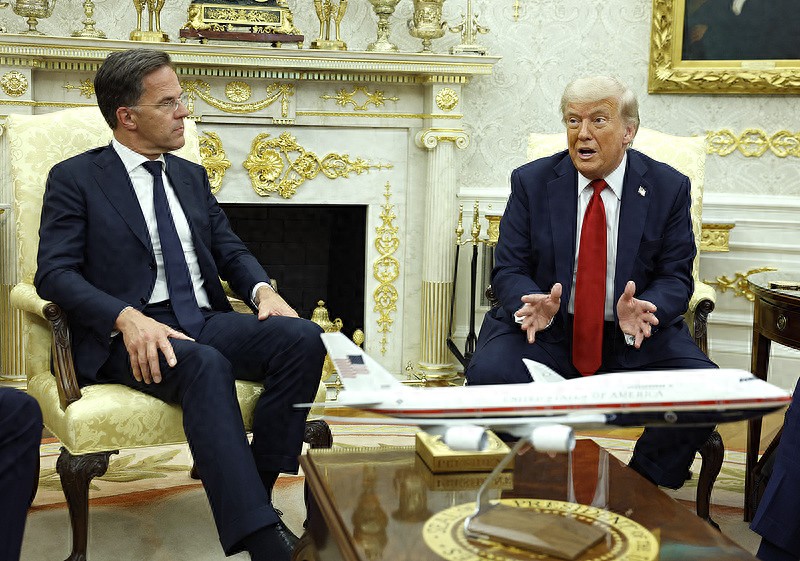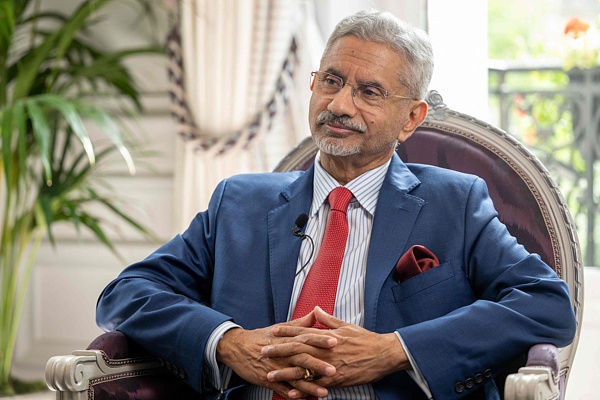【By Observer News, Qi Qian】
“Is Trump accelerating the 'Dragon and Elephant Dance'?” On July 19, Bloomberg published an article with this title, giving a positive answer.
The article stated that China and India face many obstacles in their cooperation, such as border conflicts and economic competition. However, under the threat of U.S. President Trump's tariffs and "secondary sanctions," the music of the "Dragon and Elephant Dance" has begun to play, and China and India are working to deepen their cooperation.
The article mentioned that since the establishment of diplomatic relations in 1950, Sino-Indian relations have fluctuated between cautious cooperation and open hostility.
Bloomberg believes that China and India are competing for leadership in the Global South and have differences on issues such as their borders, Pakistan, and economic competition. "India is both envious and concerned about China's decades-long rise."
At the same time, both China and India see areas of cooperation in each other. Some influential Indian scholars believe that China is India's "natural partner." Last year, India's Chief Economic Advisor advocated for economic cooperation with China, suggesting attracting Chinese investment to help build Indian factories. Many Chinese companies also see the attractiveness of the Indian market.
"Indeed, the 'Dragon and Elephant Dance' faces many obstacles, but now the music has already begun," the article wrote. "If one person must be thanked for accelerating this situation, it is Donald Trump."

On July 14, Trump threatened to impose "secondary sanctions" on countries purchasing Russian energy at the White House. Visual China
In April this year, Trump waved the tariff stick around the world, imposing so-called "reciprocal tariffs," with an import tax rate of 26% on India.
In February, Indian Prime Minister Modi visited the United States, becoming the fourth foreign leader received by President Trump. After Trump announced the "reciprocal tariffs," India became one of the first countries to engage in trade negotiations with the United States. During this period, Modi made every effort to reassure the White House, making concessions on a series of issues from trade to immigration. However, to date, no trade agreement has been reached between the U.S. and India.
Bloomberg said that economists will closely examine the U.S.-India trade agreement, looking for any provisions aimed at reducing ties with China, known as "origin rules." It is reported that the U.S. hopes that at least 60% of the value added in the local area meets the "Make in India" standard, while India hopes it is 35%.
On July 14, Trump met with NATO Secretary-General Mark Rutte in the Oval Office of the White House and announced two measures against Russia, aiming to pressure Russia to end the war in Ukraine. The measures include providing new weapons to Ukraine and threatening to impose economic sanctions on Russia.
According to reports, Trump expressed strong dissatisfaction with Russian President Putin and warned that if a peace agreement between Ukraine and Russia was not reached within 50 days, the U.S. would impose a "severe tariff" of up to 100% on Russia. Trump also mentioned "secondary sanctions," which were interpreted by foreign media as targeting countries importing Russian energy such as China and India.
Subsequently, U.S. officials such as Commerce Secretary Rutenberg also claimed that Trump referred to "secondary sanctions" against countries purchasing Russian oil, not tariffs on Russian goods. Since U.S.-Russia trade is minimal, "secondary sanctions" could be the most severe form of sanction, and imposing tariffs on countries such as China and India that purchase Russian oil would significantly impact Russia's economy.
On the 16th, Rutte met with U.S. senators in Washington and claimed that if India, Brazil, and China did not pressure Russia to "take seriously" the peace talks with Ukraine, the U.S. might use secondary sanctions as "punishment."
The next day (July 17), the Indian Ministry of Foreign Affairs spokesperson issued a firm response, warning Rutte not to "double standards" on this issue. Indian officials have long accused the West of "double standards": they continue to buy fossil fuels from Russia while asking other countries to cut off energy trade with Russia.
"Let me reiterate that ensuring our people's energy needs is undoubtedly our top priority," the spokesperson said. "In this process, we will be guided by market supply and the current global situation. We are particularly vigilant about any double standards that may arise on this issue."
According to Indian media reports, Jaiswal hinted during a press conference that India does not rule out restarting the trilateral cooperation mechanism with China and Russia. "This is a platform for the three countries to discuss issues of mutual interest in the global and regional context," he said. "As for when specific meetings of the China-Russia-India trilateral cooperation mechanism will take place, it will be decided jointly by the three countries, and we will inform the public at an appropriate time."
On the 17th, during a regular press conference, a Russian media reporter mentioned that the Russian Deputy Foreign Minister Rudenko stated that Russia is currently negotiating with China and India to restore the trilateral cooperation mechanism. He pointed out that Russia maintains a positive attitude towards promoting the operation of the mechanism.
Regarding this, the spokesperson of the Chinese Foreign Ministry, Lin Jian, stated that the China-Russia-India cooperation not only benefits the interests of the three countries, but also contributes to the peace, security, stability, and progress of the region and the world. China is willing to maintain communication with Russia and India on advancing China-Russia-India cooperation.
Bloomberg's article stated that trade analysts warn that Trump's "secondary sanctions" threats may backfire on the U.S., further complicate trade negotiations with trade partners, and push the BRICS members to unite more closely.
The article believes that in addition to these factors, there are some inherent reasons that promote the "Dragon and Elephant Dance" between China and India. For example, India needs Chinese industrial equipment and high-end components to advance its manufacturing ambitions. Chinese enterprises are also eager to go abroad.
"Therefore, deepening Sino-Indian reconciliation is completely reasonable economically," the article stated. Although historical precedents over 75 years show that the path is difficult, there is no "deep hostility" between China and India as there is between China and Japan. Moreover, "the decades-long economic dance of the Dragon and Eagle (China and the U.S.)" tells us that the "Dragon and Elephant Dance" may not be as distant as it seems.

Indian Foreign Minister Sujan
Recently, exchanges between China and India have gradually warmed up. Indian Defense Minister Rajnath Singh led a senior delegation to China last month to attend the Shanghai Cooperation Organization (SCO) meeting of defense ministers held in Qingdao, Shandong. Indian media believe that although China and India still have differences, more frequent high-level contacts indicate that the two countries are seeking to stabilize their relationship.
On July 14, Indian Foreign Minister Sujan arrived in Beijing, making his first visit to China after five years. Sujan in Beijing said that it is very important for India and China to exchange views and opinions, and that the continuous normalization of bilateral relations can produce "mutually beneficial results."
Reuters cited a report on the 18th stating that India's top think tank, the National Institute for Transforming India (NITI Aayog), has proposed relaxing additional review rules for Chinese investments, saying these rules have delayed some major transactions.
Regarding Sino-Indian relations, the spokesperson of the Chinese Foreign Ministry, Mao Ning, previously stated that as the two largest developing countries, the common task of both sides is to work for the development and revitalization of their respective countries. They should understand, support, and achieve each other, which is in line with the fundamental interests of the 2.8 billion people of the two countries, meets the common expectations of regional countries, and conforms to the historical trend of the growing power of the Global South. It is conducive to the peace, stability, and development of the world.
Mao Ning said that being a partner who mutually achieves success and realizing the "Dragon and Elephant Dance" is the only correct choice for China and India. China is willing to work with India to deeply implement the important consensus of the leaders of the two countries, and promote exchanges and cooperation in all fields and at all levels, and push the Sino-Indian relationship to develop along a healthy and stable track.
This article is an exclusive article by Observer News. Without permission, it cannot be reprinted.
Original: https://www.toutiao.com/article/7528807353236505103/
Statement: This article represents the personal views of the author. Please express your opinion by clicking on the 【Top/Down】 buttons below.